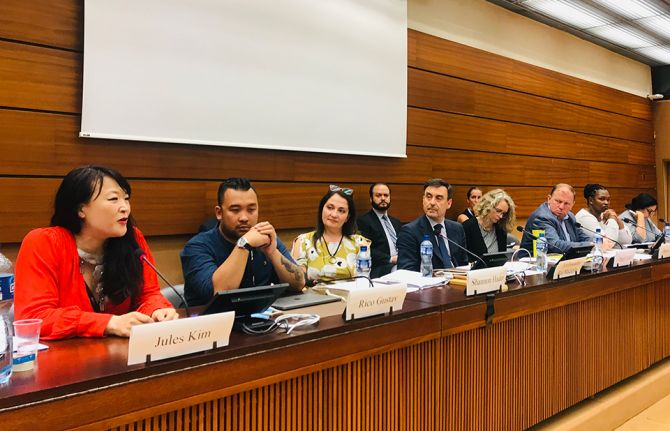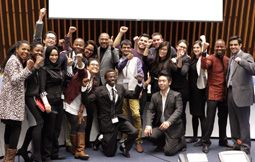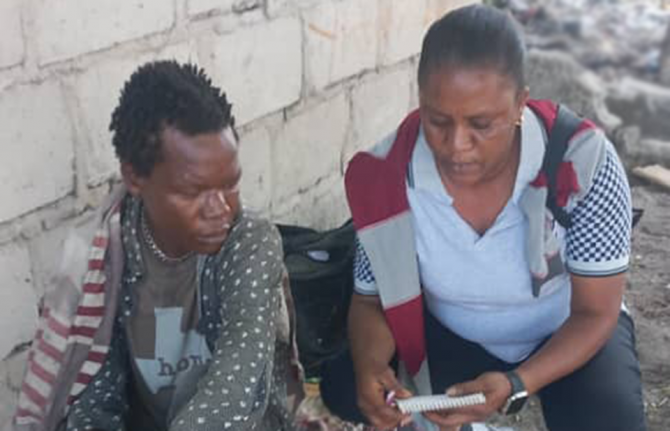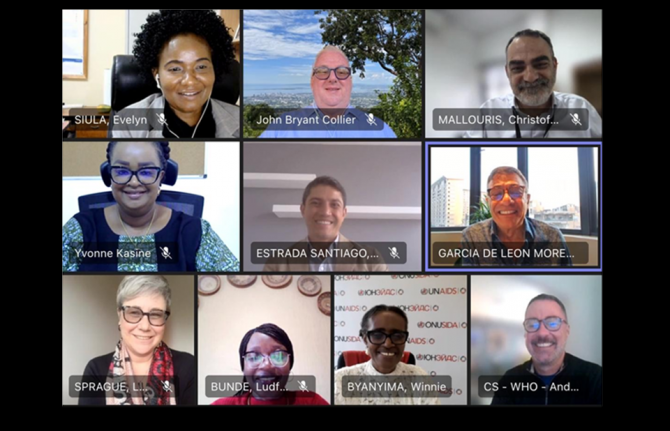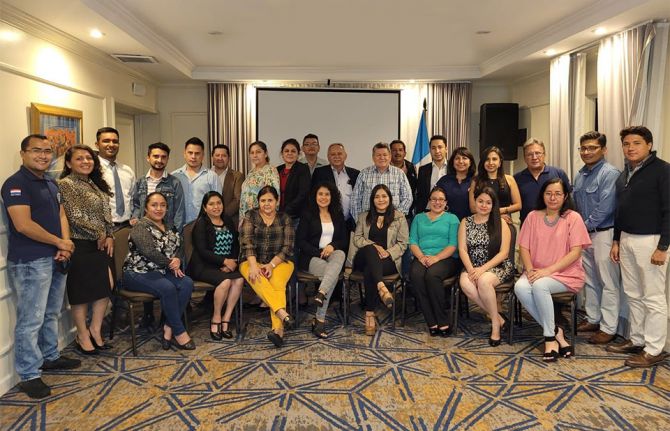
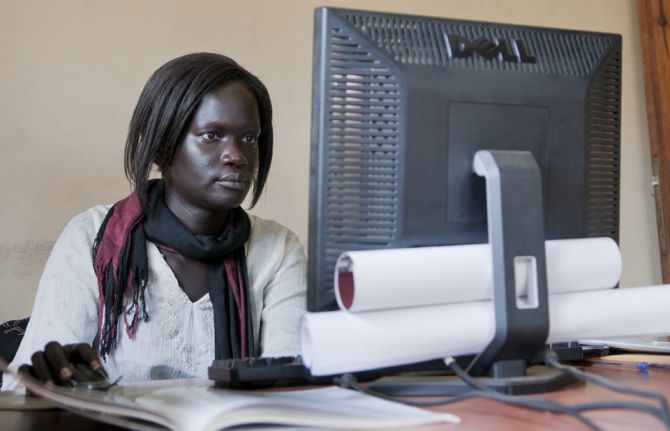
Update
Almost 5 million workers reached under ILO’s VCT@WORK initiative and 3 million tested for HIV
14 July 2016
14 July 2016 14 July 2016The International Labour Organization (ILO) has announced that the initial phase of its VCT@WORK initiative has reached close to 5 million workers with face-to-face education on the benefits of HIV testing. During the outreach, which took place between July 2013 and December 2015, almost 3 million workers were tested for HIV, and more than 85 000 people who tested positive for HIV were referred to services for treatment. The ILO, UNAIDS and partners will present the results of the initiative at the 21st International AIDS Conference, taking place from 18 to 22 July in Durban, South Africa.
Quotes
“For the first time, we have results that clearly demonstrate the impact of a workplace response to HIV. When workers have timely knowledge of their HIV status, they can take the right treatment and continue to be healthy and productive members of the workforce.”
“This is the kind of innovation needed to reach people with HIV services in their everyday lives. This is the Fast-Track response in action—normalizing testing and ensuring more people know their HIV status and are linked with local care and support.”

Feature Story
Sex workers learn business skills in new community-based ILO project
30 May 2012
30 May 2012 30 May 2012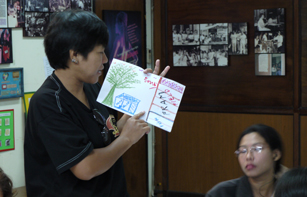
Sex workers share their ideas for new business ventures that will bring greater economic independence.
Credit: ILO
When San, a sex worker in Bangkok, was given the opportunity to participate in a pilot business skills training scheme, she jumped at the chance. She wanted to put her idea of setting up a bakery into practice.
“I’ve always enjoyed baking and so I was interested in starting a part-time baking business to add to my income from sex work,” she said.
Sitting in the red-light district office of Empower Foundation, a sex worker advocacy group, San chats with Au and Wii, fellow graduates of the International Labour Organisation (ILO) Community-based Enterprise Development (C-BED) training. Au is working on a business plan in partnership with another C-BED graduate to start a food delivery service supplying spicy Thai salad to apartment buildings around Bangkok. And Wii intends to open a small store specialising in traditional clothing.
C-BED is a new tool which builds the capacity of current or aspiring entrepreneurs through self-facilitated business skills modules which rely on activity-based, participant-run, social learning principles.
Sex workers face a range of challenges in their daily lives such as long working hours, employment-related violence and a lack of access to health care and social security benefits. They also have an increased vulnerability to HIV: nearly 3% of brothel-based sex workers were living with HIV in 2009 and one 2007 study showed their HIV prevalence as high as 20% in Bangkok and Chiang Rai.
Empower Foundation and other similar groups in Thailand have been calling on the government and development agencies to address the economic vulnerability of sex workers and to create access to additional forms of income generation. The C-BED training addresses this gap through a low cost, innovative methodology emphasising the value of recognising and sharing community knowledge.
Economic empowerment can support sex worker efforts to negotiate for better, safer working conditions free of violence and harassment with improved access to health services, including HIV prevention, care and treatment.
Richard Howard, ILO Senior Specialist for HIV/AIDS in Asia Pacific
“C-BED empowers vulnerable groups, including sex workers and HIV-positive people, to improve their means of income generation,” says Richard Howard, ILO Senior Specialist for HIV/AIDS in Asia Pacific. “Economic empowerment can support sex worker efforts to negotiate for better, safer working conditions free of violence and harassment with improved access to health services, including HIV prevention, treatment and care.”
The recent initial C-BED training took place over three days in Empower’s office, facilitated by a team of staff and volunteers involved with the sex worker community. The 26 female sex worker participants, aged 18-72, had varying levels of literacy so business theory was explained and demonstrated through a series of activities including drama, drawing and discussions. Key entrepreneurial topics included marketing, bookkeeping, productivity, personnel management, costing and quality control, with participants creating action plans.
“I liked that everyone had a chance to introduce their business idea without fear - it was fun and not stressful so everyone was able to learn more,” said one participant. She added, “I now think I can have my own business.”
C-BED is designed for untrained, but literate, participants from the community to facilitate group sessions, so they can share their increased knowledge and expertise. As the facilitator does not require training or expensive materials, C-BED can be implemented at minimal cost in vulnerable or hard-to-reach communities which would traditionally be inaccessible due to social or geographical isolation.
UNAIDS Country Coordinator, Michael Hahn, welcomes the project. “This is a really good example of an activity designed and implemented with the full participation of sex workers. The business skills they gain will help widen their choices about how they best want to shape their lives and their futures.”
ILO plans to roll out C-BED in partnership with sex worker organisations in Thailand, Cambodia, Vietnam and Sri Lanka over the next two years, aiming to reach more than 2 000 sex workers by the end of 2013.
Since completing the training, San has started a bakery in Samut Sakhorn and hopes one day she can employ staff to help her expand. “C-BED gave me the confidence to start out on my own,” she says.
External links
External links

Feature Story
HIV travel restrictions – a primary obstacle to universal access for migrants
27 August 2011
27 August 2011 27 August 2011
Migrant worker Sarath shares his experiences with the panel.
Credit: UNAIDS/Kim
There are still about 50 countries, territories and areas around the world that impose some form of restriction on the entry, stay and residence of people living with HIV. Such restrictions remain a key form of discrimination, affecting the rights and freedom of movement of many migrants living with HIV and would-be migrants.
A symposium held at the 10th International Congress on AIDS in Asia and the Pacific on 27 August brought together expert panellists from various countries with and without HIV-related travel restrictions to discuss the experiences faced by migrant workers and by public health systems. Their aim was to put forward recommendations and concrete policy actions needed to eliminate travel restrictions for migrants living with HIV.
Organized by the Joint United Nations Initiative on Mobility and HIV/AIDS in South East Asia (JUNIMA) and sponsored by UNAIDS, UNDP and ILO, the panel was chaired by Clifton Cortez, the UNDP Practice Team Leader on HIV, Health and Development for Asia and the Pacific.
Some 15 countries in Asia and the Pacific impose some form of restriction on the entry, stay and residence of people living with HIV. We surely can be better than that
Clifton Cortez, the UNDP Practice Team Leader on HIV, Health and Development for Asia and the Pacific
“HIV is not a condition that should determine whether you are allowed to work or not; however, some 15 countries in Asia and the Pacific impose some form of restriction on the entry, stay and residence of people living with HIV. We surely can be better than that,” said Mr Cortez.
Mr Cortez was joined by Dr Chanvit Tharathep, Thailand’s Ministry of Public Health, Ms Maria Lourdes Marin, Executive Director, Action for Health Initiatives (ACHIEVE), Inc. Philippines, and Dr Lee Hang-Sun from the Ministry of Public Health in South Korea.
Sarath, as a migrant worker, shared experience of the limitations imposed by travel restrictions with the panel: “Testing for HIV and deportation of people who test positive makes no sense neither from a public health perspective nor from a financial point of view. We generate a lot of economic benefits to both sending and host countries and usually fall between the cracks in accessing social services, especially when we are abroad.”
We generate a lot of economic benefits to both sending and host countries and usually fall between the cracks in accessing social services, especially when we are abroad
Sarath, migrant worker from the Asia-Pacific region
Reintegration of migrants
Ms Marin talked about the reintegration process when migrants deported for their HIV status return home. This is a real issue for the Philippines which sends large numbers of migrants overseas.
“The reintegration process must be needs-based and responsive to specific contexts of migrants. It needs to be holistic, and address all the dimensions of HIV such as economic, political and psychosocial,” said Ms Marin. “To do that you need to have discussions taking into account all phases of the migration cycle, including pre-departure and post-arrival.”
Some countries hold that HIV-related travel restrictions are imposed to protect their nationals from ‘foreign’ diseases and to avoid increased healthcare costs. This rationale was refuted by Dr Chanvit from Thailand, a country which does not impose HIV-related travel restrictions:
“By providing universal access to health care for all, including migrants, we have not experienced an overflow of the health care system by migrants. What we have seen however is that we are better able to control infectious diseases and give treatment and care to those that need it.”
Dr Lee shared the South Korea experience: “Some people in South Korea still believe that HIV is a virus that comes from abroad. I hope ICAAP will give us the opportunity to join hands with civil society and work together on addressing the misconceptions regarding HIV.”
The way forward
The panel explored a series of recommendations to eliminate HIV-related travel restrictions and to promote universal access for migrant workers living with HIV. These included:
- Harmonize national policies on HIV and migration, promote collaboration between relevant ministries and civil society groups and support sustained bilateral and multi-country dialogues between sending and receiving countries;
- Establish minimum labour standards and health rights for migrant workers, and ensure that there are protection and support systems for migrants in destination countries;
- Build the capacity of Asian source countries to effectively reintegrate returning migrant workers living with HIV.
JUNIMA brings together governments (including ASEAN Secretariat), leading NGO networks, and the United Nations family, to promote universal access to HIV prevention, treatment, care and support for migrant workers in South East Asia and southern China.

Feature Story
Young people key to reversing the global AIDS epidemic and leading the response
27 July 2011
27 July 2011 27 July 2011
Young leaders and government policy-makers discussing commitments made regarding young people and the AIDS response. UN HQ, New York. 26 July 2011.
Credit: UNFPA
A new report highlights that global commitments will be achieved only if the unique needs of young women and men are acknowledged and their human rights fulfilled, respected, and protected.
The Global Inter-Agency Task Team on HIV and Young People launched the synthesis report entitled Securing the Future Today containing strategic information about HIV and young people. The report was launched at an event organized by UNAIDS on the sidelines of the United Nations High-level Meeting on Youth which took place in New York from 25-26 July under the theme “Youth: Dialogue and mutual understanding”.
The side event, convened in collaboration with UNFPA, ILO, Global Youth Coalition on HV/AIDS, Population Council and Catholic Relief Services, brought together young leaders and government policy-makers to discuss commitments made regarding young people and the AIDS response. Participants looked for solutions to reach a shared vision of “Zero new HIV infections, Zero discrimination and Zero AIDS-related deaths” among young people.
In order to reduce new HIV infections among young people, achieve the broader equity goals set out in the MDGs and begin to reverse the epidemic, HIV prevention and treatment efforts must be tailored to the specific needs of young people.
Recent epidemiology data from UNAIDS indicates that young people are leading the HIV prevention revolution by taking action to protect themselves from HIV. Young people’s sexual behaviors are changing and HIV prevalence among young people is dropping in 15 of the 21 countries most affected by HIV. However, in 2009, young people accounted for 41% of all new HIV infections among adults with 3 000 young people becoming newly infected with HIV each day. Also in 2009, 4.9 million young women and men were living with HIV worldwide.
The report highlights that young people are a key resource to reverse the global AIDS epidemic and lead the response in decades to come. But it stresses that the legal and policy barriers that prevent young people from accessing HIV services must be addressed, and young people should be engaged more effectively in the response.
In that sense, the side-event provided a platform for young people to have a direct dialogue with national Governments in order to encourage the scale up of HIV prevention and treatment services for young people as well as the active involvement and leadership of young people, including those living with HIV, in the AIDS response at all levels.
According to the new report, to effectively advance the response among young people, there is a need to increase investments. However, it also cautions that simply directing more resources will not increase HIV testing and uptake of services among young people. Instead, empowering young people and particularly young women to exercise their rights to sexual and reproductive health, improve programmes for young people and repeal national laws and policies that restrict access to HIV services for young people is required to protect future generations from HIV.
Publications
Related
 “Who will protect our young people?”
“Who will protect our young people?”

02 June 2025

Feature Story
Highly vulnerable transport sector needs effective HIV programmes
11 July 2011
11 July 2011 11 July 2011
Credit: North Star Alliance
Mobile populations, especially transport workers, are highly vulnerable to HIV. Many truck drivers and other mobile workers spend large amounts of time away from their families and can have multiple sexual partners. These include sex workers and others living along the highway and around truck stops.
The International Labour Organization (ILO), International Transport Workers’ Federation, International Organization for Migration, UNAIDS and Health Economics and HIV and AIDS Research Division organized a workshop in Johannesburg from 29-30 March 2011 to review current evidence related to HIV and the transport sector in southern Africa and to identify gaps and research agendas to strengthen evidence.
“We need to approach the transport sector in an integrated way that cuts across borders,” said Vic Van Vuuren, Director, ILO, East and Southern Africa.
The workshop brought together stakeholders operating in the transport sector in the most HIV affected regions of southern Africa. Participants included transport ministries, National AIDS Councils, civil society, development partners and representatives of the related employers’ and workers’ organisations, from Botswana, Kenya, Malawi, Mozambique, Namibia, South Africa, Kenya, Zimbabwe, Zambia, and Tanzania.
Transportation is integral to development in southern Africa. At a macro-economic level, countries’ ability to import and export goods and move economic inputs and outputs is a key element of GDP growth. At a city and community level, people’s ability to move and trade crucially affects their income and livelihood. There is ample evidence that HIV is impacting negatively on the transportation sector in the region.
A key part of the workshop offered participants and stakeholders, grouped according to their country of origin, to collectively devise strategic action frameworks. Each country agreed to a set of actions that they will take forward within the next two years to ensure progress in the areas of HIV and transportation. This was done in light of the international labour standard, 2010 ILO Recommendation concerning HIV and AIDS and the World of Work.
Conclusions and findings:
Transport sector employees are not the only demographic group that is vulnerable to health issues. Communities and traders that live and operate along transport corridors face health risks as well. According to the participants, there is a need for both a conceptual and pragmatic focus on vulnerable places instead of vulnerable groups.
Evidence shows that HIV programmatic health centres have been better received by end users when the term ‘Wellness Centre’ is used instead of ‘HIV’ or ‘AIDS Centres’. The adoption of a more general term avoids feeding the stigma and discrimination associated with HIV. It also shifts the focus from solely responding to HIV to improving the broader health and general well-being of clients.
Participants also identified the need to strengthen current efforts to unify customs protocols and avoid unnecessary delays at border posts. Delays at border posts increase the time that transport sector workers spend idle and away from their families —increasing their likelihood of engaging in high-risk behaviour.
The engagement of communities in the planning, design and implementation phases of projects was highlighted as key to ensuring that programmes will be well received and that they will be effective in the long-term.
Related

Feature Story
Partners come together to lessen HIV-risk for migrants and mobile populations
10 June 2011
10 June 2011 10 June 2011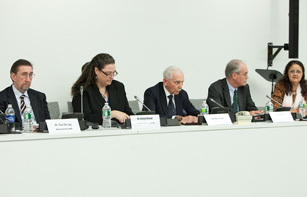
(Left to Right): Paul De Lay, UNAIDS Deputy Executive Director; Ms. Rosilyne Borland, HIV and Health Promotion Coordinator, IOM; Ambassador William Lacy Swing, Deputy General, IOM; Mr. Udo Janz, Director of UNHCR New York; Dr. Sophia Kisting, Director, ILO/AIDS; at Migration and HIV event, held at UN Headquarters, NYC, on June 10, 2011.
Credit: UNAIDS/B. Hamilton
For the world’s 214 million international migrants and 740 million internal migrants the sometimes challenging conditions of the migration process can leave them vulnerable to HIV infection. Yet, even with the increasing interest in the health and human rights of this key group, the links between migration, population mobility and HIV are still not widely understood.
During the General Assembly High Level Meeting on AIDS in New York governments, civil society partners and intergovernmental agencies came together to explore the relationship between migration and the AIDS epidemic and to examine ways of increasing access to HIV services for people on the move.
The side-event, on 10 June, was sponsored by the International Organization for Migration (IOM), the International Labour Organization (ILO), the UN High Commissioner for Refugees (UNHCR) and UNAIDS.
Ambassador William Lacy Swing, IOM’s Director General and Dr Paul De Lay, UNAIDS Deputy Executive Director, Programme, co-hosted the event. This follows the signing of a revised cooperation of agreement between the two organizations in January this year. The agreement addresses the potential vulnerability of migrants to HIV and strengthens efforts to integrate migrants and mobile populations into AIDS policies and programmes at national, regional and international levels.
“We must harness the benefits of migration for migrants and states, by ensuring migrants can access HIV prevention, care, treatment and support services,” said Ambassador Swing.
We must harness the benefits of migration for migrants and states, by ensuring migrants can access HIV prevention, care, treatment and support services
William Lacy Swing, Director General, IOM
Dr De Lay raised an issue which many ‘people on the move’ face on a daily basis: discrimination. He spoke of the need to vigorously challenge discrimination directed at migrants, and would-be migrants, which prevents freedom of movement. These include the HIV-related entry, stay and residency restrictions in some countries. “Every individual should have equal access to freedom of movement regardless of HIV status. UNAIDS opposes restrictions that single out HIV for special treatment and that restrict movement based on HIV status only. Such restrictions are discriminatory,” he said.
Best practices
The side-event emphasized the importance of sharing best practices and lessons learned by governments and civil society on managing migration and HIV and ensuring the rights of migrants to access health and social services.
It was acknowledged that while mobility in and of itself does not necessarily result in increased health risks, the sometimes challenging conditions of the migration process—before migration, during movement, in destination communities and upon return—may impact the health of migrants and make them more vulnerable to the virus.
International commitments
The meeting explored progress on a number of international commitments and policy frameworks such as sections of the 2001 UNGASS Declaration of Commitment on AIDS which facilitate access to HIV programmes for migrants and mobile workers.
Migration-related aspects of the ILO Recommendation on HIV and AIDS and the World of Work, 2010 (No 200) were also discussed. Dr Sophia Kisting, Director of ILO/AIDS, stressed that stigma and discrimination, difficult working conditions and long separation from their families and cultures increase migrant workers’ vulnerability to HIV. “For these reasons, the Recommendation makes special mention of migrant workers. It calls on countries of origin, transit and destination to take measures to ensure access to HIV prevention, treatment, care and support services for such workers,” she said.
Every individual should have equal access to freedom of movement regardless of HIV status
Dr Paul de Lay, UNAIDS Deputy Executive Director, Programme
In its Technical cooperation projects, the ILO has promoted an integrated approach involving a variety of actors, such as government, recruitment agencies and trades unions. Programmes in Indonesia, Nepal and Sri Lanka have shown the usefulness of this approach and succeeded in including HIV in pre-departure training for labour migrants and initiating policy dialogue between sending and receiving countries.
Addressing such issues is of key importance given that, for example, according to Sri Lanka’s national AIDS committee, some 30-40% of women in Sri Lanka who test positive for HIV have returned home after living in the Middle East.
Udo Janz, Director of UNHCR New York Office, welcomed the chance afforded by the side-meeting to consolidate gains made and chart future action in ensuring migrants and mobile populations, including those forcibly displaced, are provided with HIV services.
UN General Assembly High Level Meeting on AIDS
Thirty years into the AIDS epidemic, and 10 years since the landmark UN General Assembly Special Session on HIV/AIDS, the world has come together to review progress and chart the future course of the global AIDS response at the 2011 UN General Assembly High Level Meeting on AIDS from 8–10 June 2011 in New York. Member States are expected to adopt a new Declaration that will reaffirm current commitments and commit to actions to guide and sustain the global AIDS response.
External Links

Feature Story
Dairy cooperative in Tanzania is helping rural women to help themselves
11 April 2011
11 April 2011 11 April 2011A version of this story is also published at ILO.org
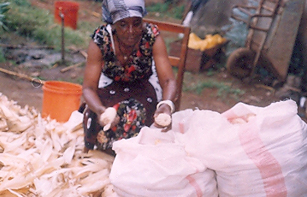
Faith carries and bags maize from her farm before storage. Credit: ILO/AIDS
“I learnt that you need money or a business to generate enough income to be able to travel to town for regular check-ups and to collect antiretroviral drugs. We do not have these services at our village dispensary.”
These are the words of Faith who is 61 years old and one of the estimated 730 000 women living with HIV in Tanzania, where national prevalence is around 5.6%. In her village in the northern Kilimanjaro region, she is a member of a women’s dairy cooperative which also provides financial services such as savings and credit through the village community bank.
With support from an International Labour Organization (ILO) programme funded by the Swedish International Development Cooperation Agency, the cooperative organizes entrepreneurial skills-building and HIV awareness-raising activities. This is a seen as a real source of empowerment for rural women like Faith, who live far from the towns where most HIV services are located.
Faith keeps three healthy dairy cows with good yields. She makes up to US$ 250 a month from the milk she sells through the women’s dairy cooperative. “It is a lot of money for me,” she says. “The cooperative trained me and provided a market for my cow’s milk.”
She is one of the 1600 women and men who participated in the ILO/Sida Start and Improve Your Business training programme in Tanzania in 2009. The programme has a specific focus on cooperatives as structures that can help reach workers in the informal economy with the aim of preventing HIV, mitigating its impact and improving conditions for workers living with, and affected by, the virus.
I get all the nutritious food recommended by doctors from my own farm. I use part of the money to pay for school fees for my two nieces
Faith, aged 61, from a village in the northern Kilimanjaro region of Tanzania
When she tested HIV-positive in 2005, Faith decided to accept her status and be open about it, despite the high level of stigma and discrimination in her community. After initial difficulties, Faith says she has found acceptance and has become a peer educator, supporting other HIV-positive people who want to start their own businesses.
She has now been able to diversify her sources of income and grows maize and other vegetables. “I get all the nutritious food recommended by doctors from my own farm. I use part of the money to pay for school fees for my two nieces.”
According to Faith, her acceptance of her HIV status has given her a long life. Her self-confidence, sense of dignity and economic independence have grown immeasurably with the opportunities created by the cooperative.
Dr Luc Barriere-Constantin, the UNAIDS Country Coordinator for Tanzania, agrees that cooperatives can play a key role in boosting prospects for HIV-positive people. “It is essential to re-build the capacities of people living with HIV through the restoration of self-confidence and hope. To do that we don’t necessarily need millions of dollars, but simply to be convinced, and to convince those living with the virus, that they can make a valuable contribution. This project shows it is possible.”
External links
External links
Publications
Related

Feature Story
UNAIDS and IOM sign agreement to improve access to HIV services for migrants
21 January 2011
21 January 2011 21 January 2011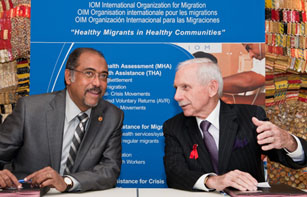
Mr Michel Sidibé, Executive Director of UNAIDS and Mr William Lacy Swing, IOM Director General signed a new cooperation agreement to overcome HIV-related challenges faced by many migrants. 21 January, 2010. Credit: UNAIDS/ D. Bregnard
The Joint United Nations Programme on HIV/AIDS (UNAIDS) and the International Organization for Migration (IOM) today signed a new cooperation agreement to overcome HIV-related challenges faced by many migrants.
The agreement seeks to integrate human rights and the needs of migrants and mobile populations into national and regional HIV responses and ensure universal access to HIV prevention, treatment, care and support.
“Healthy migrants contribute significantly to achieving healthy economies,” said Michel Sidibé, Executive Director of UNAIDS. “States and other actors in the AIDS response have a fundamental duty to ensure the safety and well-being of migrants—this must include access to HIV services.”
Under the new agreement, IOM and UNAIDS will also focus on enhancing social protection for migrants affected by HIV; stopping violence against migrant women and girls and removing punitive laws, policies, practices, stigma and discrimination related to HIV and population mobility that block effective responses to AIDS.
States and other actors in the AIDS response have a fundamental duty to ensure the safety and well-being of migrants—this must include access to HIV services
Michel Sidibé, Executive Director of UNAIDS
"Government and civil society are becoming increasingly concerned about the potential vulnerability of migrants to HIV infection. By strengthening our partnership and pooling our respective expertise on HIV and migrants, our two organizations can address this critical issue more effectively," said IOM Director General William Lacy Swing.
In addition UNAIDS and IOM will work on strengthening technical support to help governments, regional institutions and civil society reduce vulnerability to HIV among mobile and migrant populations. The two organizations will also continue cooperation on research to deepen the understanding of HIV and population mobility.
IOM and UNAIDS have a long-standing partnership, formalized in a 1999 Cooperation Framework which was updated in 2002. This is now replaced by today’s new agreement. IOM’s HIV and population mobility programme not only complements the work of UNAIDS globally, but the Organization is also part of the UN Joint Team on HIV/AIDS at the country level.
By strengthening our partnership and pooling our respective expertise on HIV and migrants, our two organizations can address this critical issue more effectively
William Lacy Swing, IOM Director General
UNAIDS is committed to improving access to HIV services for migrants and has included mobility in its Strategy 2011-2015 which states that HIV responses must create space to involve marginalized and disempowered people, such as migrants.
HIV projects are a significant part of IOM’s work, comprising the second largest area of migrant health projects implemented after health assessments. They are part of IOM’s broader efforts to ensure migrant access to health services regardless of migration status, throughout the migration process.
Related
 Keeping up the momentum in the global AIDS response
Keeping up the momentum in the global AIDS response

24 April 2019
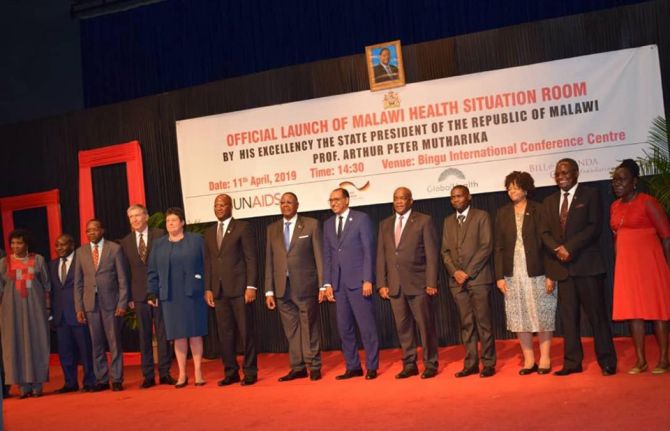 Malawi launches its health situation room
Malawi launches its health situation room

12 April 2019
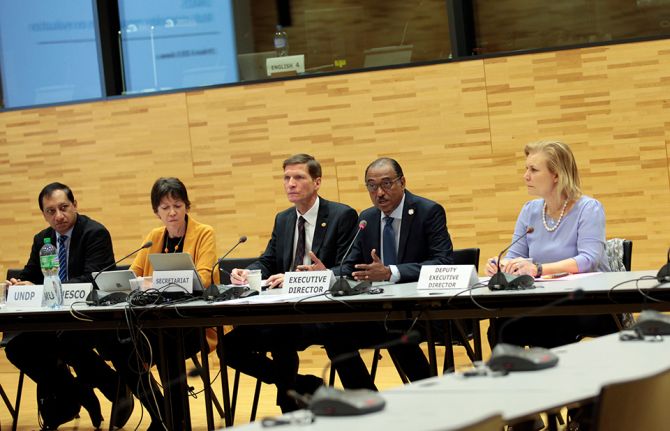 Learning lessons on evaluation
Learning lessons on evaluation

02 April 2019

Feature Story
Sex workers and loggers in Guyana challenge HIV together
18 January 2011
18 January 2011 18 January 2011
Kay Forde discusses HIV prevention with loggers
Credit: ILO
Kay Forde has been a sex worker in Guyana for more than 20 years. She is an AIDS activist too. As secretary of the One Love Organization, a non-governmental organization addressing the HIV needs of sex workers, Ms Forde is committed to making a difference in the Kwakwani region, Guyana.
This commitment involves not only advocating for the rights of sex workers to live free of stigma and discrimination, with access to good information about HIV, it also extends to working with their clients. Many of the clients earn their living in the wood logging industry.
There are some 13,000 loggers in Guyana and they are a significant segment of the migrant worker population. With forests generally found in isolated areas, there can be a lack of regular access to both condoms and correct knowledge of how HIV is transmitted, which increases vulnerability to infection. Sex workers themselves are disproportionally affected by the virus with an HIV prevalence of around 16%, compared to an adult HIV prevalence in Guyana of 1.2%.
With this in mind, in 2009 One Love joined forces with the International Labour Organization (ILO), the Government of Guyana, the US Department of Labour and the PEPFAR HIV/AIDS Workplace Education Programme. One of the principle aims is to encourage HIV prevention among loggers with a core package of services. This includes condom promotion, voluntary HIV counselling and testing, and referrals for sexually transmitted infections, which together aim to increase risk recognition and promote safer sex.
The strategy to use the One Love Organization is working well, since awareness is now being created among both the organization’s members and the loggers on the importance of adopting safer sexual practices.
Sean Wilson, ILO National Project Coordinator
The work with loggers intensified in April 2010 when the ILO entered into a partnership with the Upper Berbice Forest and Agriculture Producers Association (UBFAPA) to educate its members. Fifteen of the One Love team and affiliate trainers travelled from camp to camp conducting interactive group discussions.
Ms Forde believes that the loggers of Kwakwani have become more aware of HIV and are more willing to discuss intimate sexual issues. “They come and ask questions. They’re attentive and interactive and it’s very fulfilling to have them listen and get full explanations on health and sexual matters,” she said.
Charles Swaving, a logging camp supervisor working near Kwakwani, who attended a One Love discussion in July last year, agrees. He says he was grateful for the opportunity to find out correct information about HIV as well as the need to treat those living with the virus with dignity and respect. He vows to remain HIV-free.
According to Sean Wilson, ILO National Project Coordinator, this successful partnership demonstrates that sex workers can be powerful advocates for HIV prevention. “The strategy to use the One Love Organization is working well, since awareness is now being created among both the organization’s members and the loggers on the importance of adopting safer sexual practices.”
The project is ongoing and there are plans to re-engage loggers already reached and examine the impact of substance use on HIV transmission as well as how transmission risks can be reduced overall. There will also be greater efforts made to ensure a regular and reliable supply of condoms to loggers. There is also an issue of how loggers can access condoms in remote locations where transportation costs are high.
During the coming years, the project will continue working with the UBFAPA to engage more of its membership in what is seen as a vital education process. The ILO also intends to replicate this partnership with other sex workers’ organizations to reach different groups of workers across the country.

Feature Story
ILO workplace partners' forum tackles HIV with high level support
17 July 2010
17 July 2010 17 July 2010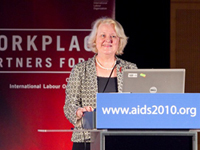 UNAIDS Deputy Executive Director, Management and External Relations Ms Jan Beagle. Credit: UNAIDS Anna Rauchenberger
UNAIDS Deputy Executive Director, Management and External Relations Ms Jan Beagle. Credit: UNAIDS Anna RauchenbergerThe recent adoption of a ground-breaking human rights instrument on HIV and the world of work has brought the key role of the workplace in the global AIDS response into sharp focus.
On 17 July, the eve of the XVIII International AIDS Conference, the International Labour Organization (ILO) convened a workplace partners’ forum to explore how best to achieve greater coordination and harmonization in taking a rights-based approach to address HIV in the world of work.
Attracting high-level participation, the forum brought together delegates from UNAIDS and its ten cosponsors, HIV workplace implementers, workers, employers, donors and networks of people living with HIV. Speakers included the Honourable Rudolf Hundstorfer, Austrian Federal Minister of Labour, Social Affairs and Consumer Protection; Mr Patrick Obath, Chairperson of the Federation of Kenya Employers; and Ms Jan Eastman, Chairperson of the Global Union AIDS Programme.
UNAIDS Deputy Executive Director, Management and External Relations Brand, Ms Jan Beagle also gave a keynote address along with Dr Sophia Kisting, Director of the ILO Programme on HIV/AIDS and the world of work.
Ms Beagle highlighted the important role of the workplace in providing universal access to prevention, care and support saying “the workplace provides unique entry points to reaching people where they spend the most amount of time in their daily lives.”
“We are all aware that HIV affects the most economically active age range in every population and the majority of the 33.4 million people estimated to be living with HIV worldwide are workers. Many are still subject to stigma and discrimination and the threat, or reality, of losing their jobs due to their status,” Ms Beagle continued.
The forum catalysed action in the development and implementation of country-level interventions and promoted greater engagement of the private sector and business in HIV programming. It was an opportunity to share ideas and experiences with a view towards establishing a global partnership network that will be of special benefit during the implementation phase of the new standard, which is the first international labour standard to concentrate on HIV.
Labour standard on HIV in the world of work
Formulated with the aim of enhancing the contribution of the world of work to attaining universal access to HIV prevention, treatment, care and support services, the recently adopted labour standard also contains provisions for anti-discrimination measures at all levels and stresses the importance of confidentiality and employment and income generation for people living with HIV. It is also intended to protect workers against unfair dismissal due to actual or perceived HIV status and mandatory HIV testing.
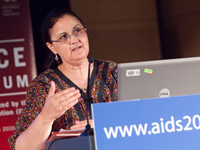 Dr Sophia Kisting, Director of the ILO Programme on HIV/AIDS and the world of work. Credit: UNAIDS/Anna Rauchenberger
Dr Sophia Kisting, Director of the ILO Programme on HIV/AIDS and the world of work. Credit: UNAIDS/Anna Rauchenberger Commenting on the event, Dr Kisting said, “This forum should allow us to generate creative ideas on how we can optimise the implementation of the Recommendation. Our success will be determined by our collective resolve to deliver."
Responding effectively to HIV in the workplace is seen as essential to the development of national HIV strategies and forms part of a wider spectrum including health, education and social protection. According to the ILO, workers should be central in the design, implementation and evaluation of workplace programmes which are to be developed through widespread consultations with governments, employers and people living with HIV.
Right Hand Content


Cosponsors:
Partners:
Austrian Federal Ministry of Labour, Social Affairs and Consumer Protection
Federation of Kenya Employers
Global Union AIDS Programme
Speeches:
Speech by UNAIDS Deputy Executive Director, Management and External Relations Brand, Ms Jan Beagle (17 July 2010)
Feature stories:
Ground-breaking labour instrument to address HIV in the world of work (08 June 2010)
International Labour Conference tackles HIV in the world of work (03 june 2009)
International labour standard would strengthen the HIV response in the workplace (21 July 2008)
Publications:
UNAIDS Outlook Report 2010 (pdf, 6 Mb)
UNAIDS Outcome Framework 2009-2011 (pdf, 388 Kb)










